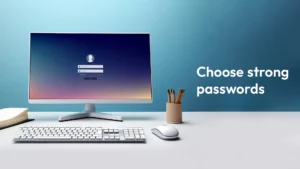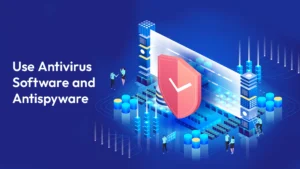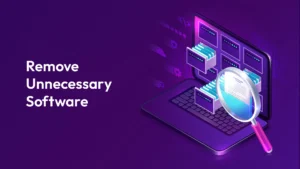In our day-to-day activities, we rely on internet-connected devices for various purposes, such as researching, shopping, studying, gaming, and connecting with loved ones on social media.
As a result, our devices store significant personal information, including financial and health data that we aim to protect. To ensure the privacy and security of yourself, your family, and your business, it’s crucial to implement safety measures and adhere to good practices in safeguarding your devices.
Here are some tips to help reduce your online risks:
1. Choose Firewall Protection
A firewall is like a security guard for your computer. It can be a software program or a piece of hardware that stops hackers from getting into your computer and using it without your permission. They act as a barrier, only allowing communication with sources you approve.
Most operating systems come with built-in firewalls, and it’s essential to enable them. Additionally, consider investing in a dedicated hardware firewall for an extra layer of protection, especially if you’re using a home network.
2. Choose strong passwords
Passwords serve as the first line of defense against cyber-attacks and are tough for hackers to figure out. Unfortunately, many online users don’t use complex passwords, making them vulnerable to security breaches. Surprisingly, almost two-thirds of people reuse passwords on multiple sites, and 36% of users have weak passwords.
To create a strong password, follow best practices like using numbers, passphrases, password generators, and having 12 or more characters. Avoid reusing passwords and refrain from using easily memorable combinations like birthdays or personal information directly related to you. If the information in your password can be found on your Facebook page or through a simple Google search, it’s better to remove it.
3. Setup Two-Factor Authentication
Having two-factor authentication adds an important layer of security to your system. It significantly reduces the risk of unauthorized access even if someone manages to get hold of your password. This additional step ensures that only individuals with access to your secondary authentication method, like your phone or authentication app, can successfully log in.
Implementing two-factor authentication is a proactive measure to safeguard your sensitive information and accounts. It adds an extra barrier that can stop various cyber threats, including phishing attempts and password breaches. As technology evolves, incorporating such security measures becomes crucial in maintaining the integrity of your online presence. Therefore, taking the time to enable two-factor authentication is a small yet impactful step toward enhancing the overall security of your digital accounts.
4. Use Antivirus Software and Antispyware
Antivirus, or anti-malware, is software designed to safeguard your computer from viruses and malware. It plays a crucial role in detecting, removing, and preventing malicious software, ensuring the security of your sensitive data across devices, networks, and IT systems. Using antivirus is a straightforward and effective method to protect your computer, requiring just a simple click of a button.
Anti-spyware is specialized software that discreetly observes and collects user data. It acts as a protective shield, stopping direct contact with harmful websites and filtering out unwanted ads and search results targeting the sites you browse. Notably, some spyware captures financial details and passwords with each keystroke, and anti-spyware can proactively block such threats in real time.
5. Remove Unnecessary Software
Unnecessary programs create potential vulnerabilities, making your system susceptible to cyber threats. Take proactive measures by regularly evaluating and removing software that is no longer essential or used. Confirm the safety of removal to prevent any unintended consequences.
By keeping only what is necessary, you not only secure your system but also reduce the potential attacks. This simple yet effective practice strengthens your computer against vulnerabilities, ensuring a more robust and secure digital environment. Regularly audit and remove unnecessary software to bolster your computer’s resilience against potential cyber risks.
Conclusion
Safeguarding your computer from hackers and viruses is paramount for a secure digital experience. Start by installing reliable antivirus software and keeping it updated for maximum protection. Regularly update your operating system and all installed applications to patch potential vulnerabilities. Exercise caution when clicking on links or downloading files, prioritizing trusted sources. Implement strong, unique passwords and consider using two-factor authentication. Remove unnecessary software to reduce potential attack surfaces. Back up your data regularly to prevent data loss in an unforeseen event.
By adopting these practices, you strengthen your computer against cyber threats and ensure a safer and more resilient computing environment.







